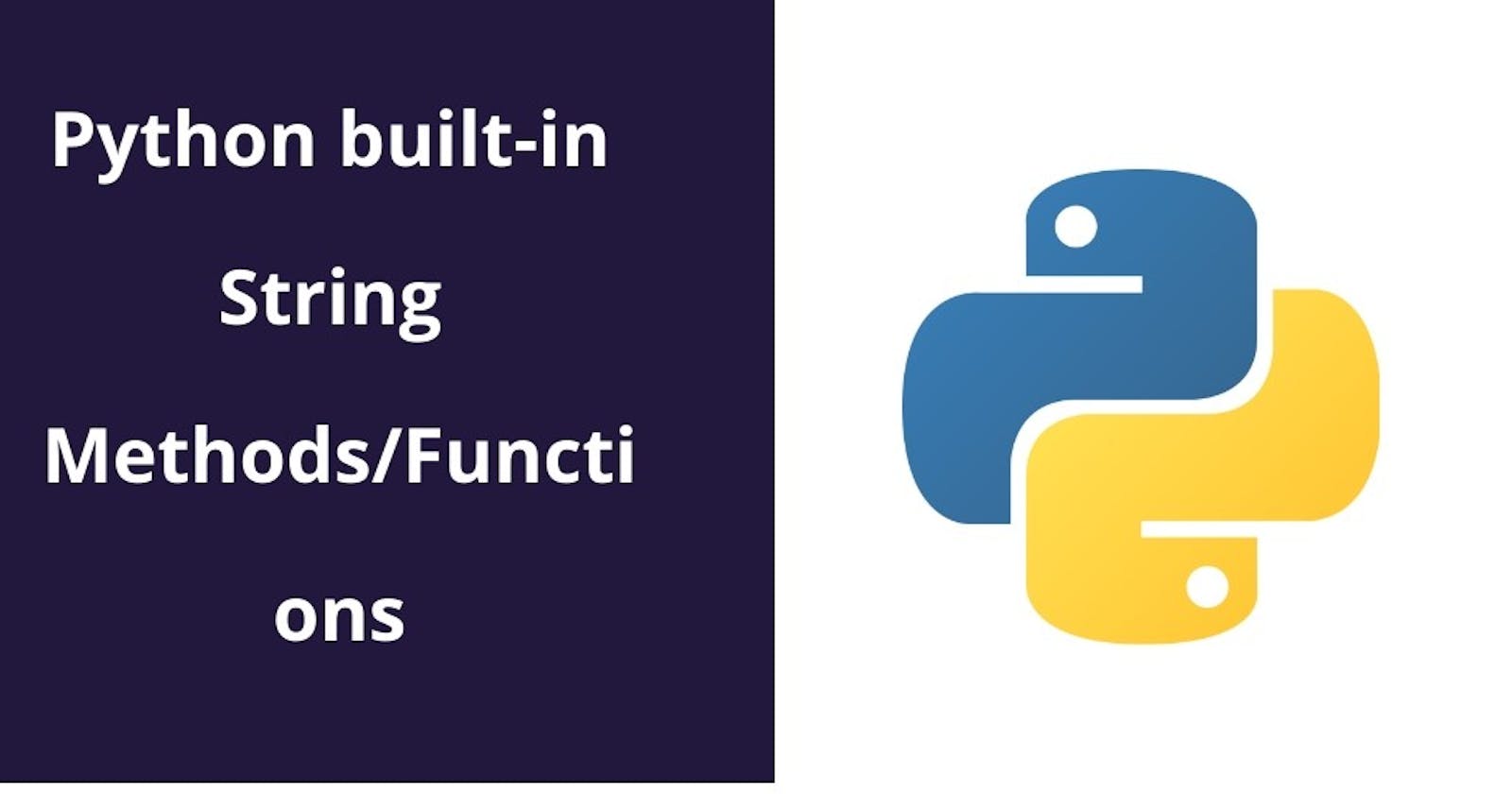These are basic string functions() in python🐍.
So, let the journey🏁 begin🚀....
find()
The find() method finds the first occurrence of the specified value. The find() method returns -1 if the value is not found.
input : string = 'python dev' f = input.find(dev) print (f) Output : 7 w = input.find(z) print(w) Output : -1format()
The format() method formats the specified value(s) and insert them inside the string's placeholder. The placeholder is defined using curly brackets: {}
input : string = "For only {price:.2f} dollars!" print(input.format(price = 49)) Output: For only 49.00 dollars!index()
This method returns the position at the first occurrence of the specified value.
fruits : string = ['apple', 'banana', 'cherry'] x = fruits.index("cherry") Output: 2isalnum()
isalnum() function in Python programming language checks whether all the characters in a given string is alphanumeric or not. Alphanumeric:A character that is either a letter or a number
Input : string = 'abc123' Output : True Input : string = 'abc 123' Output : Falseisalpha()
The isalpha() methods returns true if all characters in the string are alphabets otherwise, It returns false.
Input : string = 'Developer' Output : True Input : string = 'The boy' Output : False Input : string = 'Devs0212' Output : Falseisdecimal()
It is a function in Python that returns true if all characters in a string are decimal. If all characters are not decimal then it returns false.
input : string = '12345' Output : True input : string = '12e3y45' Output : False input : string = '12 45' Output : Falseisdigit()
isdigit() is a built-in method used for string handling. The isdigit() method returns true if all characters in the string are digits otherwise, It returns false
Input : string = '15460' Output : True Input : string = '154ban60' Output : Falseisidentifier()
The isidentifier() method returns true if the string is a valid identifier, otherwise false. A string is considered a valid identifier if it only contains alphanumeric letters (a-z) and (0-9), or underscores (_). A valid identifier cannot start with a number, or contain any spaces.input: 'Mydemo' print(input.isidentifier()) Output: True input: 'My demo' print(input.isidentifier()) Output: Falseisnumeric()
The isnumeric() method returns True if all the characters are numeric (0-9), otherwise False. Exponents, like ² and ¾ are also considered to be numeric values. "-1" and "1.5" are NOT considered numeric values, because all the characters in the string must be numeric, and the - and the . are not.input: '1235' Output : True input: '12b3o5' Output : Falseisspace( )
The isspace() methods returns “True” if all characters in the string are whitespace characters, Otherwise, It returns “False”.Input : string = '\n \n \n' Output : True Input : string = 't\n h\n e\n' Output : Falseistitle( )
The istitle() method returns true if all words in a text start with a upper case letter, and the rest of the word are lower case letters, otherwise false. The function "istitlte()" does not take any parameter!input : string = 'Hello' print(text.istitle()) Output: True input : string = 'hello' print(text.istitle()) Output: Falseisprintable( )
The isprintable() method returns true if all the characters are printable, otherwise false.input : string = 'Hello' Output: True input : string = 'Hello!\nAre you #1?' Output: Falseisupper()
The isupper() methods returns true if all characters in the string are uppercase otherwise, It returns false. The function "isupper()" does not take any parameter!Input : string 'HASHNODE' Output : True Input : string 'hashnode' Output : Falseislower( )
The islower() methods returns true if all characters in the string are lowercase otherwise, It returns false This function is used to check if the argument contains any lowercase charactersInput : string = 'python' Output : True Input : string = 'Python' Output : Falseupper( )
The upper() methods returns the uppercased string from the given string. It converts all lowercase characters to uppercase. If no lowercase characters exist, it returns the original string.Input : string = 'coding' Output : CODING Input : string = 'CODING' Output : CODINGlower()
The lower() methods returns the lowercased string from the given string. It converts all uppercase characters to lowercase. If no uppercase characters exist, it returns the original string.Input : string = 'PYTHONISTA' Output : pythonista Input : string = 'PythoNista' Output : pythonista
Please, kindly like and comment below for constructive criticism abd feedback and you can also link up with me on this platform and also on Twitter

